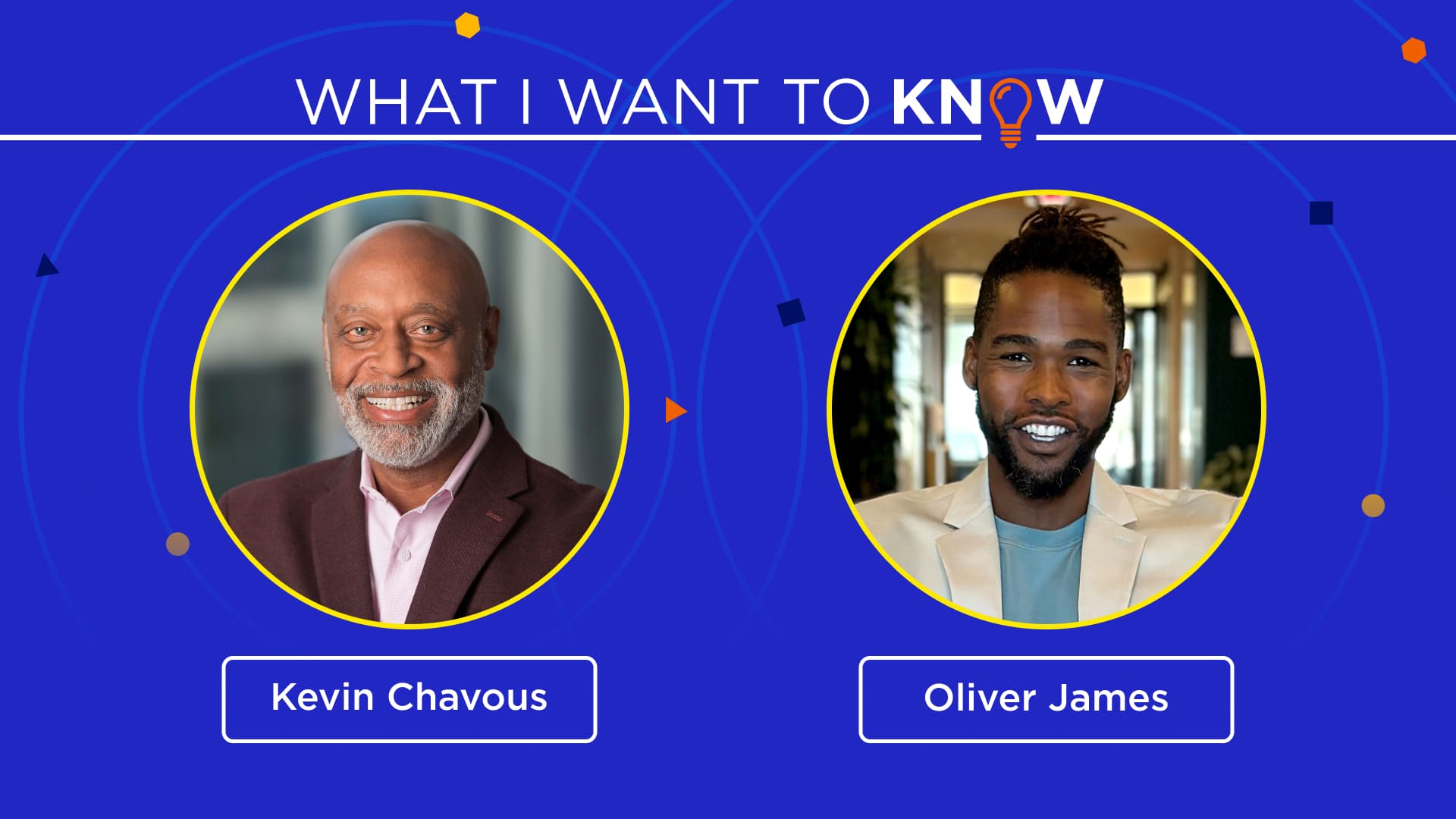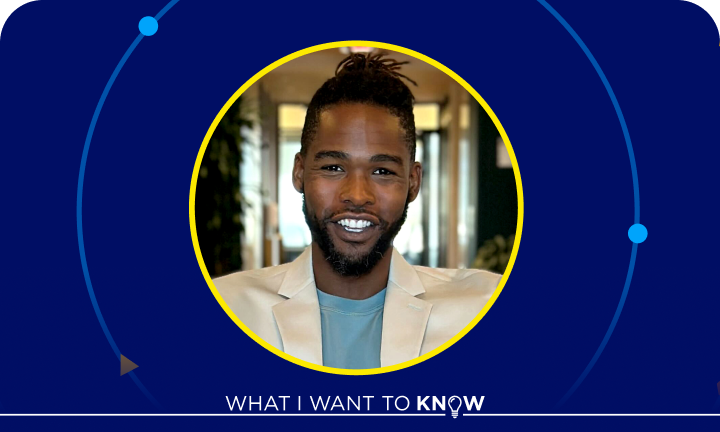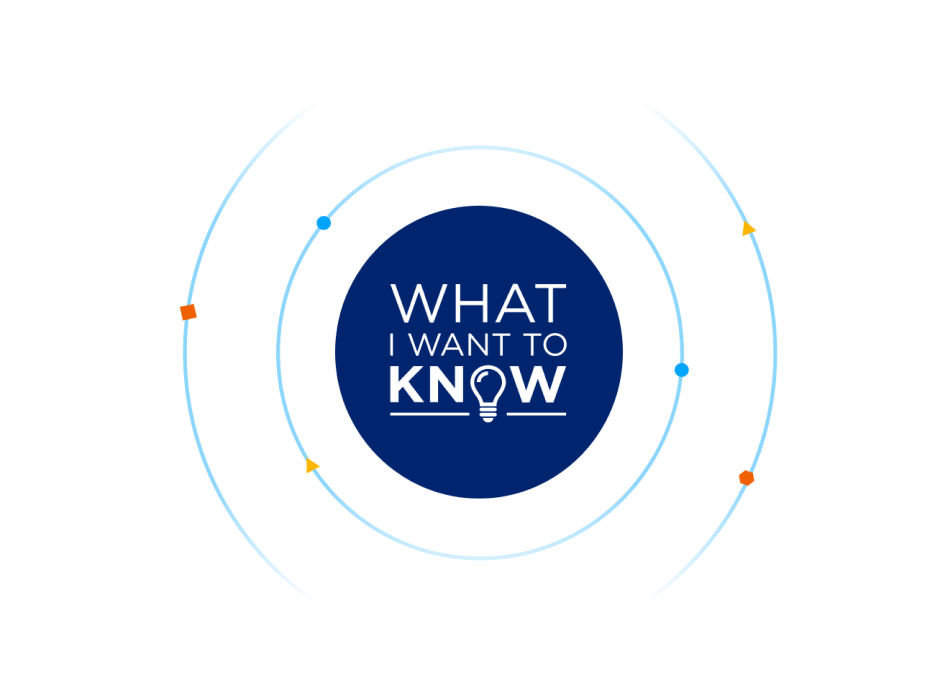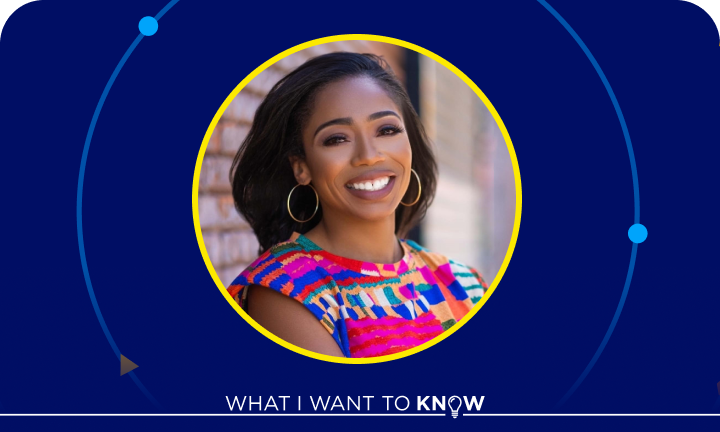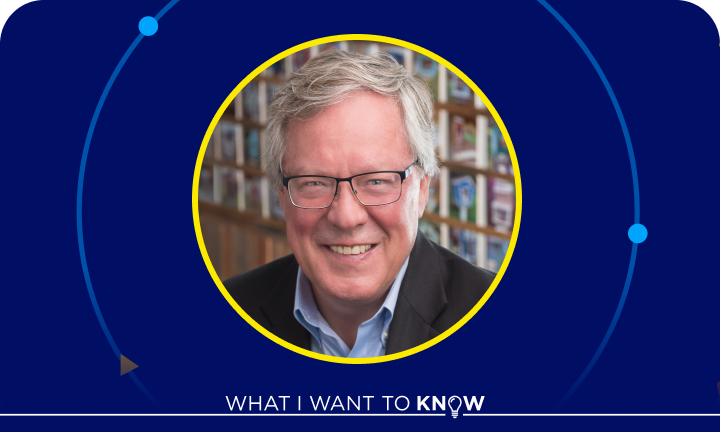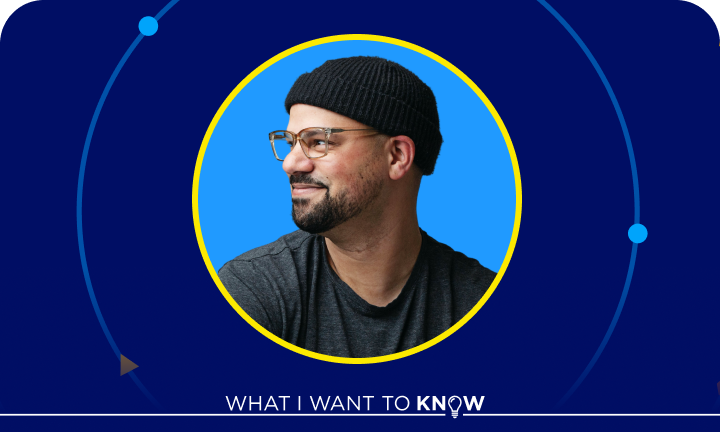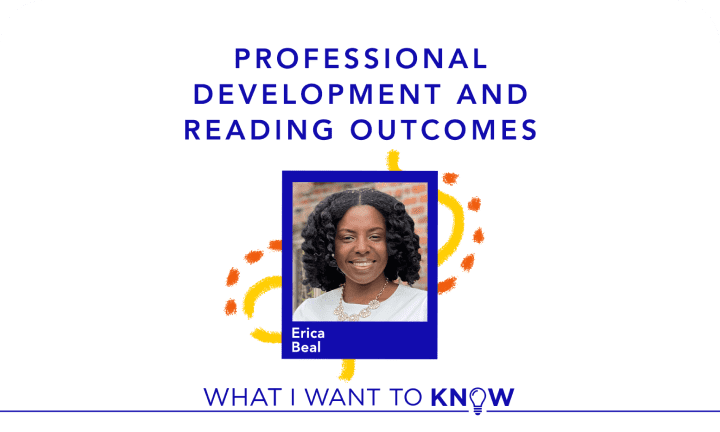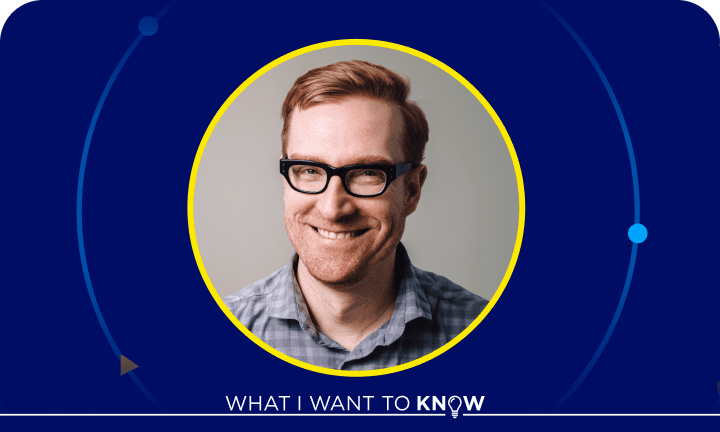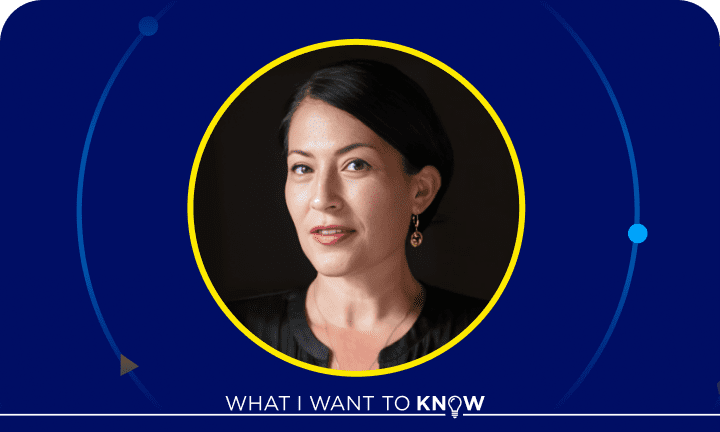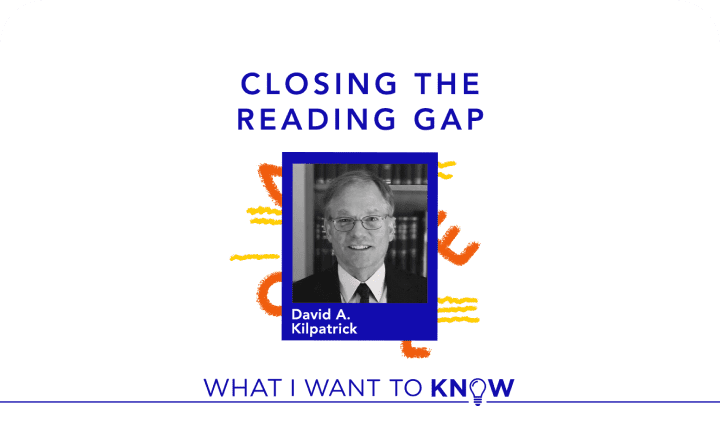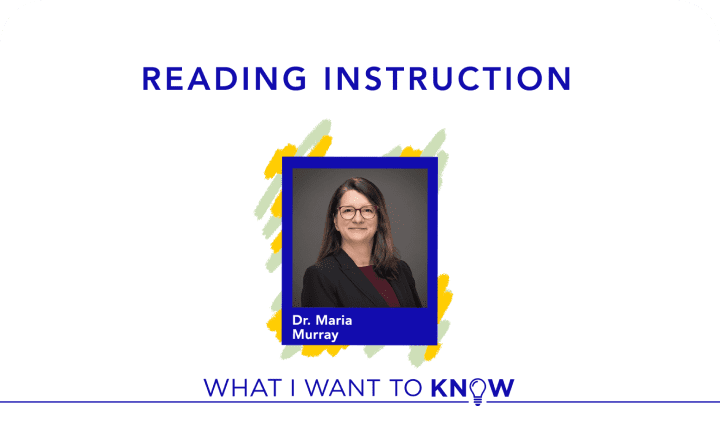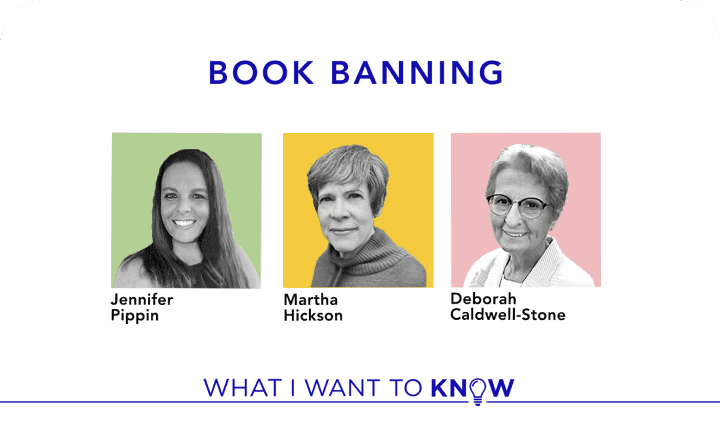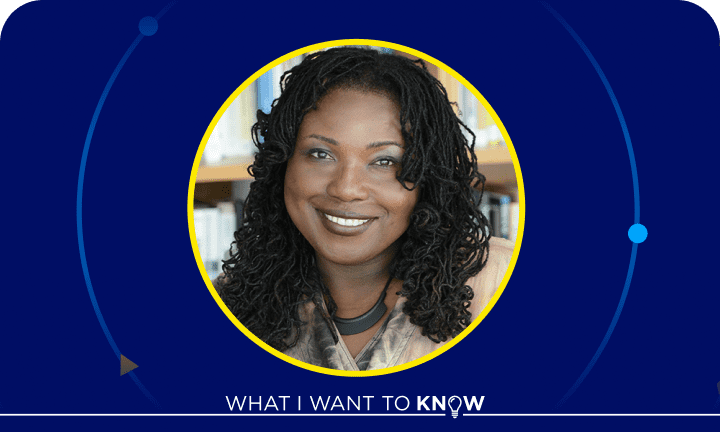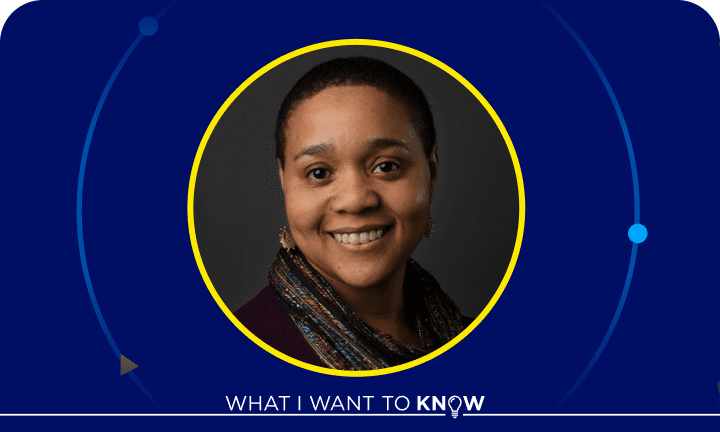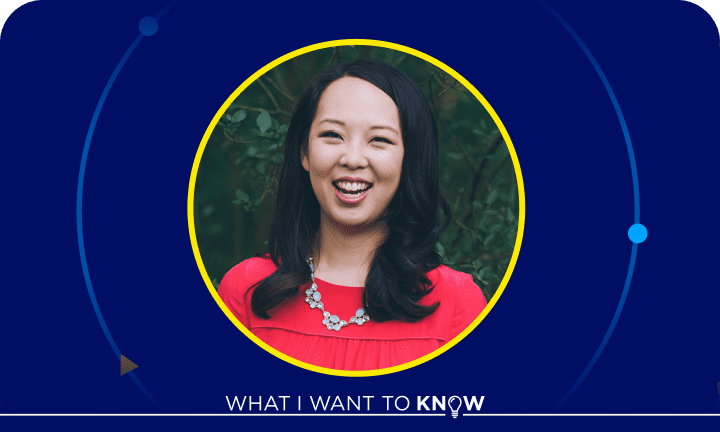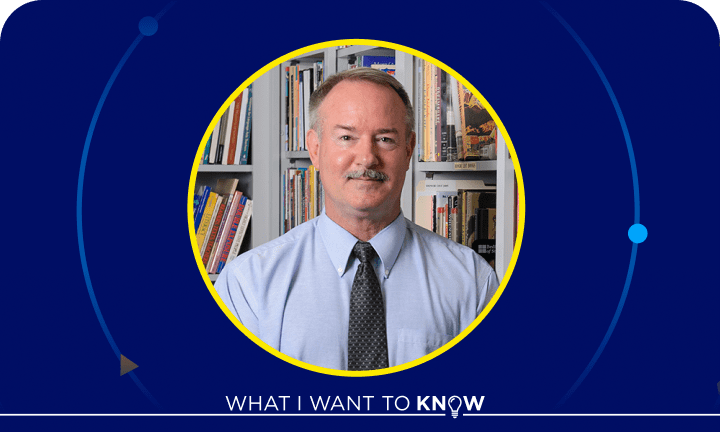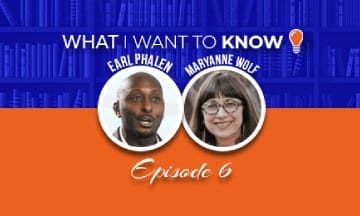March 13, 2024
EP. 145: How Can Learning to Read Change Lives
According to the Department of Education, more than 8 million Americans are considered functionally illiterate, meaning they cannot read and comprehend short texts or understand basic vocabulary.
Illiteracy often leads to low self-esteem and isolation, as well as higher chances of unemployment and poverty.
What are the impacts of illiteracy? What factors influence literacy development? And how can learning to read change lives?
Oliver James joins Kevin in this episode to share how learning to read can change lives.
Listen on: Apple Podcast, Spotify
Meet Oliver
Oliver James is a literacy advocate and social media influencer. In 2022, he began using TikTok to share his struggle with reading.
He has more than 300,000 TikTok followers and has formed a community focused on literacy and mental health.
Kevin: March is National Reading Month, and What I Want to Know is celebrating with some very special guests. Greig Metzger from Little Free Library will discuss how books can build community. Literacy influencer, Oliver James will share his inspiring story of learning how to read. Jelani Memory and I will talk about how books can introduce kids to tough topics. And author Alliah Agostini will speak on representation in children’s literature.
Educators and parents everywhere want to instill in kids a lifelong love of reading. So make sure to catch these important conversations by subscribing to “What I Want to Know” with Kevin P. Chavous on Apple Podcasts, Spotify, or your favorite podcast or social media platform. And visit K12.com reading for more resources.
Oliver: People tend to forget that reading creates a part of your identity. Like I have a different identity now that I can read. I have different friends, different social environment. Everything is different. I’ve been a certain human for 30 something years, and out of nowhere I want to start being educated? Then it’s not about the education. It’s about how much your brain can handle this new information that you’ve got coming in there.
Kevin: Yeah.
Oliver: It might not be ready for it.
Kevin: According to the Department of Education, over eight million Americans are considered functionally illiterate, meaning they’re unable to read and comprehend short texts or understand basic vocabulary. Illiteracy often leads to low self-esteem and isolation, as well as higher chances of unemployment and poverty. What are the impacts of illiteracy? What factors influence literacy development? And how can learning to read change lives? This is “What I Want to Know,” and today I am joined by Oliver James to find out.
Oliver James is a literacy advocate and social media influencer. In 2022, he began using TikTok to share his struggle with reading. He now has over 300,000 TikTok followers and has formed a community focused on literacy and mental health. He joins us today to share how learning to read can change lives. Oliver, welcome to the show.
Oliver: Thank you for having me.
Kevin: You know, I’ve read a lot about you and seen some of your posts on TikTok. You now have some notoriety, largely because you were someone who grew up originally in Pennsylvania, I think it was Bethlehem, and you couldn’t read, and you took that on. Talk about that journey a little bit from the beginning because you said you struggled in school, and so many people, as we are now here in National Reading Month, so many people are not able to read at grade level or can’t read at all, and they have a hard time facing that. And they even have a hard time functioning in a society where reading is almost a given, even when it’s not a reality. So talk a little bit about your journey as a young person and your struggles to read.
Oliver: Well, you don’t really know that there’s a struggle until you get out of it. So while I was in it, it was my only way of life, but I knew that something was wrong. Like anybody else, you know your internal gut feeling, something is not right. Growing up, it was really hard because everything I did had to be similar to more of a tail to someone. I had to always follow someone else’s behavior, their mannerisms, and I had to figure out if I wanted to take on that character or not, because when you don’t read, you don’t have a mind of your own.
Kevin: Wow.
Oliver: You start following other minds. So it’s really much of trying to figure out how to keep up with society’s ways as it moves rapidly, like in a forward direction, without the tools to do it. You’re just making it up in your head. You have no idea what to do in society.
Kevin: That’s pretty fascinating. So give a couple of examples of what you mean. I mean, I’ve never heard it quite put that way. So in other words, you say you have to follow someone else’s example. Is that because they have the knowledge that comes from being able to read every day, it could be a menu or whatever, and you just have to fake it or follow along?
Oliver: It’s more than that because people tend to forget that reading creates a part of your identity. Like I have a different identity now that I can read. I have different friends, different social environment. Everything is different. So like it’s not the same. You can’t just say teach a kid to read, teach someone to read. You’re teaching them how to become another human. Do you get what I’m saying?
Kevin: Yeah.
Oliver: That’s going to be a little shaky. That’s going to be a little scary. I’ve been a certain human for 30 something years, and out of nowhere I want to start being educated? Then it’s not about the education. It’s about how much your brain can handle this new information that you’ve got coming in there. It might not be ready for it.
Kevin: That’s fascinating.
Oliver: So that’s what I caught. Yeah, it’s a lot more than I think people know, and I think it’s a lot more than I knew myself, I’ll be honest with you.
Kevin: So talk about your schooling because, you know, a lot of people who’ve struggled with literacy say that there was a foundational gap early on, or they didn’t get to . . . talk about your educational experience as a young person where the reading never caught on.
Oliver: Well, it’s hard because I don’t think I had any like learning disabilities. I think I had some behavioral stuff going on. And that was stuff that came from my upbringing in my household. But the schools don’t know how to handle that. So they were trying to teach me, but without understanding who I was when they were teaching me. And that can’t work because we’re not robots, you know. Like when we’re growing up, we’re just like adults. We just don’t know as much as the adults know.
But truth in some way, when you’re a kid, you kind of know more because you’re not clouded by all the stuff that’s been thrown on you all the years. So you kind of see more than the adults see. It’s kind of like an adult will say don’t drink alcohol while they have a beer in their hand. Do you get what I’m saying?
Kevin: Yeah.
Oliver: But the kid can see that. But an adult will be like, “You don’t know what you’re talking about.” Like, what? That doesn’t make sense. So that’s how it was growing up. And that’s what the adults don’t see that the kids live in that world. We can see everything when I was growing up. And you know that, you knew when you were growing up.
Kevin: I absolutely do as I say not as I do.
Oliver: Yeah.
Kevin: You know, you said that as you got older, you couldn’t read and you had some challenges with the criminal justice system. But then, you know, once you started to try to get it together, you found that there were limitations on jobs, what you could do, how you could function, and you kind of moved around a little bit. Talk about that experience.
Oliver: Well, like I said, with the identity, so I gained certain skills to be able to get occupation, but it’s never the right skills. It’s always I’m lying or I’m cheating or manipulating or finding out how truth, how self-deprecating your boss might be. So I would hold on to the self-deprecation from the boss. So basically finding out the boss has a gambling issue and he doesn’t like his wife. Then I hang out with him on those hours. Now, me and that boss are real cool. He can’t fire me. I know his dark side, and we hang out on the dark time.
Kevin: Wow.
Oliver: I’m terrible at the job. I cannot do the job. I can’t do anything in the job. I show up late I don’t know anything. But I’ve got the boss under my hip and kind of in my pocket because we do the dark night stuff, and that’s who he really is. And that’s how I kept a job, you know, like by being in that world and understanding that people, they have a dark side to them, even if they’re a boss. I could keep a job by being his friend, and like, again, his tail, something that makes him feel good about life.
You know, every man wants someone to condone their bad behavior all day, right? So I would be that friend. I would be the tale to sonic. I would be that friend to go out there and do that mischief stuff because that person owns a company or might be a manager at some type of restaurant or something that I work at, whatever it was. And that’s how I maneuvered, because you can’t have a mind of your own. You see I’m latching on to someone, so I could just make it in the world. And that’s not a way of life.
Kevin: Yeah. It’s interesting because you talked about, you know, your mother. You talked about your family a little bit in some interviews I’ve seen, but while you were going through this period, while you were latching on to these bosses, you know, living this sort of manipulative existence, where you figured out how to get by, for you to end up where you are now, there must have been a little voice in your head saying, “This just don’t feel right.”
Oliver: Mm-hmm. That’s there. But it’s very similar to what I’ve gained with the reading, the internal monologue. So I don’t know how completely, you know, what was there before reading. But before reading, you have an internal voice, but it’s kind of like it’s not loud enough for you to hear it. When you start reading, the voices switch. The loud voice that was telling me to do the self-deprecating stuff turned into the voice that started to be more affirmations and positive stuff because I started exercising my brain to be able to have more positive thoughts.
When I wasn’t doing that I, didn’t understand what the internal monologue was. My internal monologue was me. So if it was me acting like a person who would go to prison or just run around and not know what he’s doing, that was me. When I started reading, my internal monologue became other people’s internal monologue because there’s more knowledge out there that I can put into my mind and help me to understand what’s going on in my mind. So those are those little voices, like when you read the book and I could turn a book into a whole movie in my head, I didn’t understand that, but that gives me freedom from the movie that was already playing in my head, if that makes sense.
Kevin: It makes sense. But at some point, even though that voice was small and you were still doing, as you said, the self-deprecating stuff, there was a motivator to get you to push forward. And what was the actual point of inspiration that said, “I have got to do this differently, I really want to learn to read”? There was something that drove that.
Oliver: Well, pandemic happened, and there was more than one thing. See as I go forward with this reading journey, and any reader can probably tell you that, I thought it was just one thing, like I want to learn to read so I can just be a reader. But that’s not how this works. Like you can’t just be a reader and then it’s done. There’s more to it that you can’t just learn to read. And 2020 came and everything was on an equal platform. So basically, like when I was being raised, I didn’t have the opportunity to be planted in the right soil so I could grow into the biggest tree that I wanted to be at that time. But when 2020 happened, we all became equal platform. If you were 40 years old, you could plant yourself in a new job. You could plant yourself in a new relationship.
2020, we all knew that we can make a change if you wanted to do it. And at that time, I started to think about what’s the one thing that I want, and I wanted freedom. I wanted freedom from the shackles that were in my mind. I was tied to things that I did not want to be tied to anymore.
So I decided, while everything was at a standstill and nothing was what it was, to create a new Oliver. I wanted to be a better father. I wanted to be able to see things better. I wanted to be able to do things that I never could do. I wanted to go to go places I couldn’t go. I wanted to be able to fill out paperwork that I’ve never filled out. Job applications, hospital bills, any of that stuff, I’ve never filled any of it, and I wanted to be able to do it myself.
I wanted to go to wake up and say, “Now nothing can stop me.” And the only thing I thought about was reading. The only thing I said that I’m not where I want to be in my life is because I can’t read that well. So I was like, “This is it. From this moment on, I’ll spend the next lifetime that I’ve got learning how to read.” And it has to give me something that I’m missing because it’s the only thing that feared me from moving forward in life.
Kevin: And ultimately you said there was one book, I think it’s “365 Quotes to Live By,” that provided a little bit of a catalyst to get you going. Talk about that.
Oliver: Well, when I first started, my lady had bought me a few books, but she bought me a quote book because I was very interested in motivational speeches. And at the time, I don’t think she knew how to buy a motivational speech book. So in truth, I don’t think she’d think I could read it. So she bought me a quote book and was like, “Read these quotes. You’ll probably like them.”
Now, before she bought the quote book. I never knew what a quote book was. So I didn’t even know that there was such thing as a quote book. So I didn’t know what I was even getting myself into. So when I started reading these things, I’m like, “What is all this? What are these?” Like I would read one quote for a week, and then when I finally would get it, I’m like, “What is he talking about? What does this mean? Like this is like someone saying something real positive.” And she’s like, “These are quotes. Just keep reading them.” And I kept reading them, and I fell in love.
I’m like I couldn’t understand how people knew how to understand these words. I couldn’t understand it at all. But I didn’t know that there was positive motivation in words. Do you get what I’m saying?
Kevin: Yeah.
Oliver: I didn’t understand. I thought it was only in lyrics or someone talking. I never knew you can get it in words. It threw me on a whole nother course.
Kevin: And that drove you, you know, to almost be a missionary. Like you were like this is a whole new world. What led you to TikTok, where now you have 300,000 followers or more, and you’ve posted videos, you’ve talked about your experience, you’ve set different goals around reading? Talk about that, you know, once you started reading those quotes, how that pushed you to the next part of your journey.
Oliver: Well, TikTok became more of like it just jumped in my lap, I guess. I didn’t really think about it. My lady, she was doing TikTok more, and I was doing Instagram. And she said, “You should go out and be yourself kind of on the camera, but do it on TikTok because it seems like TikTok has a little bit more open, like when it comes to just being yourself.”
Kevin: Yeah.
Oliver: I didn’t know much about it. So I was just telling her, “Hey, okay, I’m going to go out there and tell these people a little something about me. Just one thing that I’ve got going on that I’ve hit.” And she said, “I think you should. It’s going to really shock some people.”
So I went out and I just said it like I would tell her, and it did, it changed my whole entire life because the one thing I was hiding was the one thing that can make me who I wanted to become. I just didn’t know it. I was hiding it. If I didn’t hide it, I wouldn’t have had to go through so many different loops to get to where I wanted to get to.
Kevin: There are eight million people or more who are “functionally illiterate,” and I’m struck by, Oliver, how you’ve characterized it, like the reading has allowed you to become a different person, to think differently, to sort of operate differently, to have a different social circle. Where do you think this is going to take you?
Oliver: I don’t know. Honestly, I thought I was just going to learn to read and be the same person I was, and it’s almost impossible. You can’t learn to read and be the same person you were. And that part alone is enough to just wait. I would say I want to do a million things, but I need to keep reading. That’s all I need to keep doing right now. That’s the only thing I need to do because the answers are there for me. The answers are in the books, man.
Kevin: You’ve also said that one of the motivators is your son. And now you read with your son, don’t you?
Oliver: Yes. Every single day. We don’t read nothing too challenging, but we’ll read, you know, “Llama Llama”, you know, “Brown Bear, Brown Bear.” But I love it. I’ll be a hundred percent honest with you. And sometimes I’m stuttering through the “Brown Bear, Brown Bear,” but it feels good. It feels good to know that when he’s my age, he’ll never knew I even had this issue.
Kevin: Yeah. A couple of other questions. You know, a lot of people talk about, like I’ve been an avid reader and largely I got that from my father. And it does set you in a different direction. But there’s something sort of positively infectious about the idea of reading. It opens your world, as you’ve talked about, and, you know, all these people, and a lot of people have these reading lists, like the 100 books you have to read and all that. And, you know, I’ve created my own list. But I heard that you also now have 100 books you want to read. Talk a little bit about that and how you arrived at that.
Oliver: Well, I actually finished it off in the beginning of the year.
Kevin: Oh, good.
Oliver: I read 100 books last year.
Kevin: Congratulations.
Oliver: Thank you. I set that goal, and we finished it off. But it wasn’t something I thought I was even going to be able to do. It was just something I was trying to do to keep me motivated in reading. So I didn’t stop. I didn’t know the amount of reading I had to do. So I just set a goal that I didn’t think I could do. And let’s just say I read a bunch of children’s books.
Kevin: But you read them, that’s the important thing.
Oliver: Yes.
Kevin: You know, and that’s what’s really important. This is the last question, Oliver. This is what I really want to know. As I said, there are a lot of folks out here who can’t read. And I had one guest on talk about how they sit in class and turn the page because they saw how other people next to them would turn the page to kind of fake it, or they look at a menu even though they couldn’t read, and you’ve been through all of that kind of stuff. So talk to me, what I really want to know is what advice would you give to someone out there who’s similarly situated to you in your old life? They can’t read, they’re having a hard time, but they know they need to move in a different direction. What advice would you give them?
Oliver: You know, only a person who struggles would understand. And I would hope to give them the advice that will make them understand this world has made you believe that there’s a certain way to do things. And your belief system is clouding your growth. It is stumping your potential. It is stopping you from becoming who you want to become because you’re worried about stuff that is outside of your control. Only thing you can control is where you’re at with your life.
If you read at a first grader, you are the best first grade reader in the world. And you enjoy that. And everywhere you go, you operate as a first grade reader. And anybody who does not enjoy that, those are the people who need to get out of your life. So if you go in places and you’re like, “Hey, I don’t read that well. I need somebody who can help me. I need friends around me.” That’s the world you need to create. If you don’t do that, you will never become the person that you want to become. That’s the starting point with something like this.
They have to put themselves in that position. If they don’t do that, it’s like you’ll never be able to teach that person, kid. They have to know that handstands are allowed while they learn to read. They have to learn that their way is their way. If they don’t learn that, I’m 35 years old, I’ll go climb a tree and jump out of it and then run up the street, then go swimming, and then I open a book. And they’re like, “Why did you do all that?” Because I have ADHD and that helped me before my reading. That’s not your normal person at 35 years old.
But if I didn’t channel into that and learn that for myself, I would never learn that that’s my way. If I don’t do that, I won’t learn. I don’t have any interest. My brain gets bored sitting there trying to learn like that. I need to do more.
And that’s why I tell people out there, find your way and then you realize that you’re only stuck in this way they’ve been trying to teach you. So while you’re looking at someone who’s flipping through pages, you’re thinking that’s the right way. You get what I’m saying? Like you think like, oh, my gosh, why am I not flipping like that? I’m like you need to stop thinking any of this stuff. You get what I mean?
Kevin: Absolutely.
Oliver: That’s the part that a person needs to take on first. And that’s why I say it like this because I come from that world. I’m not saying it as a person who’s like an educator saying, “Hey, start this program. Go to this.” They’re not going to do programs. When you can’t read, they’re not going to a program because the program is already hard enough. Just because you said program, my brain already said, “No. No. Why you say that?”
Like that is who people are when they don’t know how to read. And I’m speaking directly to you because you know you’re the person who goes in and the cashier says, “Would you like to fill out . . .” And you say, “No, I’m not filling out nothing.” “Would you like . . .” “No. I don’t want to do anything.” Like why? Because you don’t want anything to do with anything extra. No reading, nothing.
That’s when you have to acknowledge that part. Like, yes, I would love to fill out that email at the cashier to register with 100 people behind me waiting to do their groceries. And you feel good about it as you’re slow, as you type one word at a time. They won’t do it because they’re scared of the 100 people in line. You go real slow with your email, and you ask the front desk lady, “Hey, I have struggled with reading. Can you type this in here?” And then you feel all the people who want you to hurry up and you say, “This is my time. I’m going to get this survey done too just like every single person, even though it takes me 20 minutes, and you’re going to have to be late for work.”
I’m sorry, but that’s the world you have to go into in order to start learning. If not, you’ll rush right out of the line. You’ll never be you. You’ll never do the thing you want to do.
That’s me. And that’s why I tell a lot of people, you go out to buy food, open a menu, you won’t do it. You’ll leave the restaurant. You’ll do something because when the waiter comes and asks you, “What would you like, sir,” and you can’t read anything on there, you need to say, “Hey, I can’t read nothing on this page. Can you read all these things to me?” With all these corporate people here, as I’m here with my business that I’m lying with and everything, you’ve got to be real. If you don’t do it, you will never learn. That’s what I’m trying to explain to you.
And that was me. I’ve been in business meetings, and I still do it now, I’m trying to tell you until this moment when I sit there now and I say, “Hey, no, I’m the guy who got hired here as the person who can’t read. Can you read this menu to me?” And they’ll do these things now. And before it was, no, it was you can’t have the job. Or you won’t even be able to come into this building. You won’t even get hired or whatever. Now they’re like, “We’ll hire the person who’s going to hold this up for another hour.” It’s like great.
Kevin: You know, it reminds me of that expression to thy own self be true. That’s really solid advice, Oliver, that everyone has to be themselves as they embark on that journey. So look, I appreciate what you’re doing. I appreciate your self-motivation. I appreciate the fact that you want to do better and be better. And on top of all that, I thank you so much for joining us on “What I Want to Know.”
Oliver: Thank you. Thank you for having me. It was amazing.
Kevin: Thanks for listening to “What I Want to Know.” Be sure to follow and subscribe to the show on Apple Podcasts, Spotify, or your favorite podcast app so you can explore other episodes and dive into our discussions on the future of education. And write a review of the show. I also encourage you to join the conversation and let me know what you want to know using #WIWTK on social media. That’s #WIWTK.
For more information on Stride and online education, visit stridelearning.com. I’m your host, Kevin P. Chavous. Thank you for joining “What I Want to Know.”
About the Show
Education is undergoing a dramatic shift, creating an opportunity to transform how we serve learners of all ages. Kevin P. Chavous turns to innovators across education, workforce development, and more to ask: “How can we do better?”
Featured Resources
Discover more resources that address the topics impacting students, families, and educators today.
